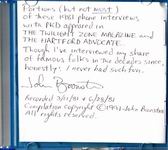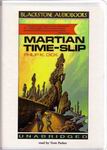
A Scanner Darkly is not only a new movie it is also an old Science Fiction novel by Philip K. Dick. When a Hollywood studio adapts one of his novels into a “major motion picture” these days we aural-literary-types are also justly blessed. For both Minority Report and Paycheck Harper Audio released the short stories as audiobook MTIs (movie-tie-ins) as read by Keir Dullea – now, with imminent release of A Scanner Darkly we’re getting what sounds like possibly the best Philip K. Dick Movie-Tie-In audiobook yet! Random House Audio is releasing….
A Scanner Darkly
By Philip K. Dick; Read by Paul Giamatti
CDs – [UNABRIDGED]
Publisher: RH Audio
Available: February 7, 2006
Price: $34.95 USD
ISBN: 073932392X
Bob Arctor is a dealer of the lethally addictive drug Substance D. Fred is the police agent assigned to tail and eventually bust him. To do so, Fred takes on the identity of a drug dealer named Bob Arctor. And since Substance D–which Arctor takes in massive doses–gradually splits the user’s brain into two distinct, combative entities, Fred doesn’t realize he is narcing on himself.
Dick was no stranger to paranoid drug fantasies. Back in 1972 with his fourth marriage in ruins, an unsolved burglary in his home and a serious amphetamine addiction Dick travlled to Vancouver, British Columbia to be Guest of Honor at V-Con, after delivering a landmark speech he attempted suicide. Desperate, Dick begged and gained entrance to a heroin addiction treatment center called X-Kalay despite the fact he wasn’t addicted to heroin. When he eventually retuned to Calfornia he started work a new novel. A Scanner Darkly was the result. Now 33 years later Dick’s novel is being adapted for audio.
Paul Giamatti (who had a supporting role in the film version of Paycheck) is set to read the unabridged audiobook! His twitchy on-screen persona should make A Scanner Darkly an awesome listen – Giamatti is the epitome of a PKD protagonist. Here’s some evidence of that – back 1994 in an interview conducted for MoviePoopShoot.com interviewer Josh Horowitz talked to Giamatti about the adaptation of Dick’s films:
JH: Speaking of which…is Paycheck more than just a paycheck?
PG: (LAUGH) Well, you know…I mean, I really do like [director] John Woo. I almost did that Windtalkers movie which I never saw.
JH: That kind of movie has to be a no-brainer to do anyway. It’s a big budget film with John Woo based on a story by Philip K. Dick.
PG: Yeah, Philip K. Dick is another reason to do it although they never do his stuff right. They turn them into these big action movies when there’s really no action in them and the heroes in them are nerdy, geeky, loser guys.
JH: So you’re saying Ben [Affleck] should have been your sidekick instead of vice versa?
PG: (LAUGHS) There you go. Exactly. It should be a guy like Steve Buscemi or somebody like that. It’s a weird guy to use as a basis for action movies.
Well said Paul!
You listen to him Hollywood, but even if you dont… please keep adapting PKD to film, we need more of his audiobooks.





 Here’s an interesting episode of WNYC’s The Brian Lehrer Show:
Here’s an interesting episode of WNYC’s The Brian Lehrer Show: